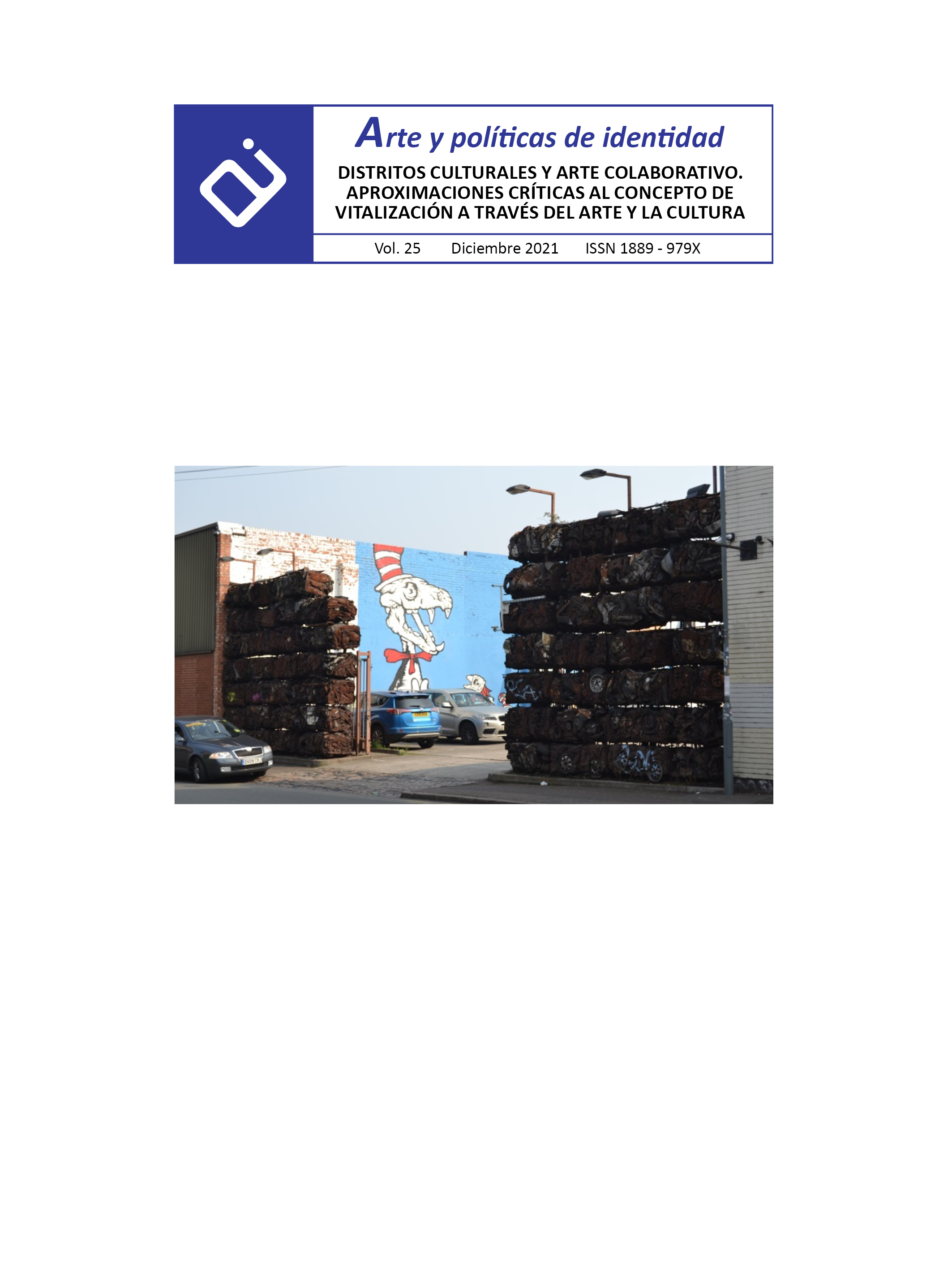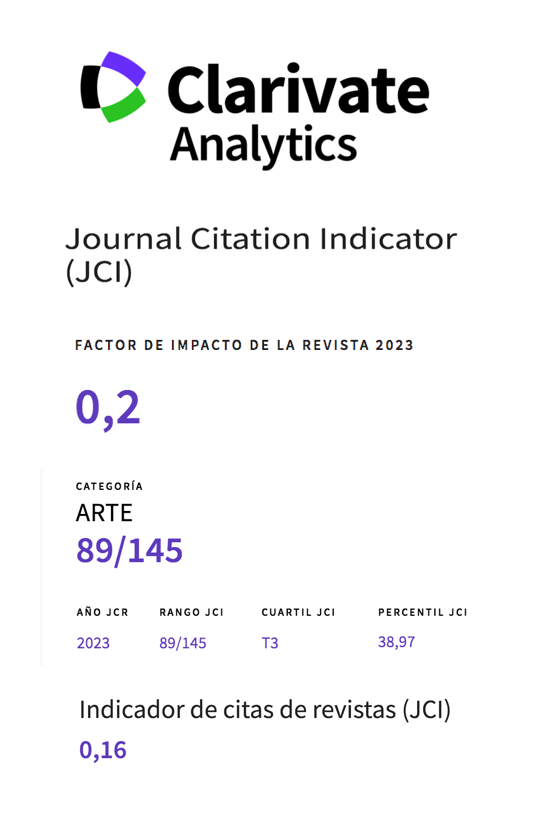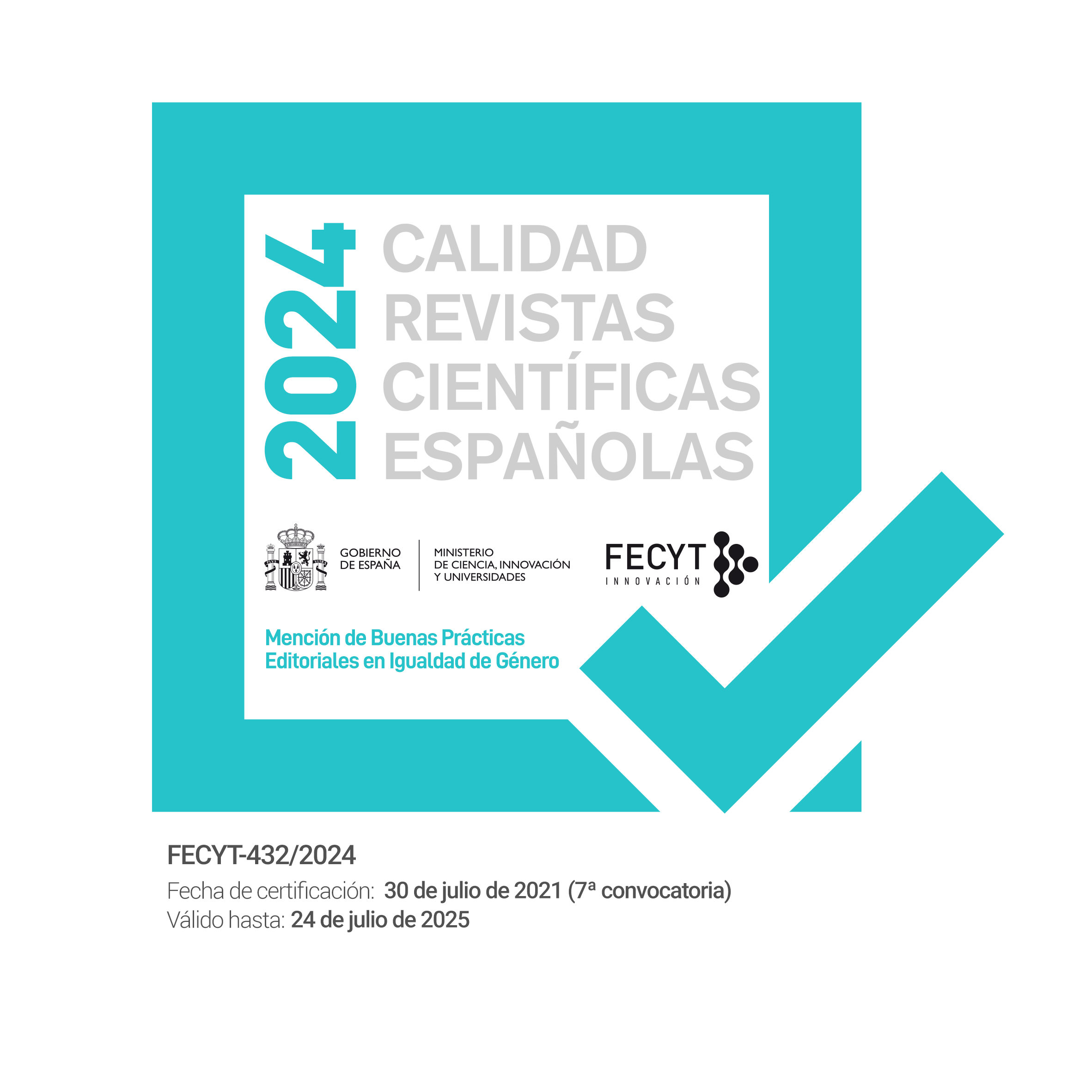Social Practices in Art in the city of Madrid: Intervention with vulnerable collectives
Abstract
As of two cases in this study which were carried out in Madrid as social practices in art, community methodologies have been detailed as practiced in order to formalize collaborative creation proposed by each one. El Beso (The Kiss) (2018) and Cuentos que nunca cuentan (Tales that are never told) (2010) were carried out by the artist Toxic Lesbian with the participation of institutions such as Medialab-Prado and Intermediae, both of which are integrated in Matadero Madrid, Contemporary art creation center of the City Hall of Madrid. Both cases involved participation of the most directly concerned audiences because of the themes undertaken: migrant women in El Beso (The Kiss) and collectives of directly involved people in mental health in Cuentos que Nunca Cuentan (Tales that are never told). The proposals presupposed intervention in the public space of the city for their production and involved a wide representation of activists and elements of social or cultural institutions. This qualitative análisis of the processes and testimonies of the agents that participated seeks delving into the motivations of communities to become involved in this type of development, the role played by institutions or the inevitable politization of the proposals by the administrative structures that finance them.
Downloads
-
Abstract455
-
pdf (Español (España))486
References
Baudrillard, J. (1978). Cultura y simulacro. Barcelona: Kairos.
Bishop, C. (2006) The Social Turn: Collaboration and Its Discontents, Artforum (Febrero, 2006) pp. 178-183
Blanco, P., (2005) Prácticas artísticas colaborativas. En Carrillo, Jesús, (coed.), Desacuerdos. Sobre arte, políticas y esfera pública en el Estado Español. Donostia: Arte y Pensamiento.
Borja-Villel, M. (2011) Hacia una nueva institucionalidad, Carta (2) pp. 1-2. Recuperado de https://www.museoreinasofia.es/sites/default/files/revista/pdf/carta2.pdf
Cabrerizo, C. Klett, A. y García Bachiller, P. (2015) De alianzas anómalas a nuevos paisajes políticos. Madrid, Lavapiés y otras geografías de lo común, Revista de Estudios Urbanos y Ciencias Sociales Vol. 5(2) pp. 163-178
ColaBoraBora (s.f.) Sobre el procomún. Recuperado de: https://www.colaborabora.org/colaborabora/sobre-el-procomun/
Fernández, O., Klett, A., López Mediero, Z., (2015) En medio de las cosas. Investigación indisciplinar, entre el espacio artístico, la academia y la ciudad, Transductores (3) pp. 223-233
Fontdevila, O. (2015) Comisariar arte colaborativo ¿Colaborativamente?, Transductores (3) pp. 211-222
Fraser, A. (2016) L’1% c’est moi. Barcelona, MUAC-MACBA. Recuperado de: https://muac.unam.mx/assets/docs/P-105-Folio_MUAC_048_Andrea_Fraser-Interiores-72dpi.pdf
Haraway, D., (1991a), Manifiesto Cyborg, Santa Cruz, University of California.
Haraway, D. (1991b) Ciencia, ciborgs y mujeres: la reinvención de la naturaleza. Madrid: Cátedra.
Imagina Madrid (2018). Recuperado de: https://www.imagina-madrid.es/es/imagina-madrid
Kester, G. (2013) Conversation pieces. Community and Communication in Modern Art. University of California Press.
Klett, A., López Mediero, Z. (2021) Instituciones públicas y cambio social: el gobierno de las cosas pequeñas. Recuperado de: https://altermediae.org/instituciones-publicas-y-cambio-social-el-gobierno-de-las-cosas-pequenas/#
Lacy, S., (1995) (Ed.), Mapping the terrain. Seattle, Washington, Bay Press.
Lippard, L. y Chandler, J. (1968) La desmaterialización del arte. Nueva York: Art International, Vol. 12, (2).
Lippard, L. (1983). Trojan horses: Activist Art and Power. En Wallis, B. (Ed) Art After Modernism. Rethinking Representation. Nueva York: Ed.: I Boston.
Lord, C. y Meyer, R. (2013). Art and Queer Culture. London, Phaidon Press.
López Mediero, Z. (s.f). “Instituciones que aprenden. Hacia un prototipo de institución amateur”. Recuperado de: https://altermediae.org/instituciones-que-aprenden-hacia-un-prototipo-de-institucion-amateur/
Nochlin, L. (1971). “Why there have been no great women artists?” Art News. Recuperado el 12 de julio de 2017 de http://www.artnews.com/2015/05/30/why-have-there-been-no-great-women-artists/
Pollock, G. (2017) Precariedad queer, la búsqueda de trabajo y la cuestión del personaje. En Cabello/Carceller y Segade, M., Borrador para una trama en curso, pp. 59-67. Madrid, CA2M ed.
Ramos, L. (19 diciembre 2019) “La división entre artistas y ciudadanos es forzada”, entrevista con Marcos García. El País. Recuperado de: https://elpais.com/ccaa/2019/12/16/madrid/1576502467_457075.html
Toxic Lesbian (2010), “Cuentos que nunca cuentan”. Recuperado de: https://www.toxiclesbian.org/proyectos-de-arte-publico-y-ciberfeminismo/cuentos-que-nunca-cuentan/
Toxic Lesbian (2018), “El Beso”. Recuperado de: https://www.toxiclesbian.org/proyectos-de-arte-publico-y-ciberfeminismo/el-beso/
Works published in this journal are subject to the following terms:
- The Service of Publications from the University of Murcia (publishing house) keeps the published works’ copyrights, and favors and allows the reuse of these works under the license indicated in point 2.
- Works are published in the journal’s online edition under the license Creative Commons Reconocimiento-NoComercial-SinObraDerivada 3.0 España(texto legal). They can be copied, used, disseminated, transmitted and publicly exhibited, as long as: i) the author and original source of publication are cited (journal, publishing house and work’s URL); ii) they are not used for commercial purposes; iii) the existence and specifications of this license are mentioned.
3. Conditions for auto-file. It is allowed and encouraged that authors share electronically their pre-print version (the pre-reviewed version) and /or post-print version (the reviewed and accepted version) of their Works before the publication, since it promotes its circulation and dissemination. RoMEO color: green.










